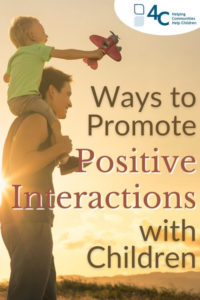
December 2022 – Published by 4-C
Early brain development and ongoing learning are shaped by the relationships and interactions a young child has with the adults in their life. For most children, this is a foundation they get from family members. Home and school connections can support positive family relationships and promote positive interactions for children.
In Early Childhood
Having positive, loving relationships with parents and other caregivers is the key to a child’s learning and development. Children learn a lot through these relationships and can impact their view of the world from love, crying, laughter and how to express themselves. These relationships play an important role in children’s development.
Here are some steps you can take to help build a positive relationship:
Be in the moment
This gives a child the chance to play, learn, and share with you in meaningful ways and lets them know you’re attentive to their needs. By putting down devices and other distractions when interacting with a child, you demonstrate that you value them, their feelings, and their thoughts. This is also a great way to form a deeper connection and bond over a child’s current interests or to teach them something new.
Spend quality time together
By dedicating time and energy to being with a child, you show them that you love and care for them and will help keep them mentally and emotionally strong. By regularly spending time together, you’re demonstrating you’re a reliable adult in their life and that they can come to you with their worries, needs, and wants. You don’t need to spend money to spend time together. Go for a walk outside, play a game together, or make your own musical instruments with items found around the house.
Create an environment of trust and respect
Positive relationships between parents/caregivers and children are characterized by open communication, conflict resolution, and affirmation of unconditional love. If a child says something that causes you to have a strong emotional reaction, try self-regulating before you respond. Discuss your feelings openly and involve the child in any conflict resolution that may be needed.
While it might be easy to let your child be on their own and entertain themselves, it’s very important you are in the moment when you’re spending quality time with them. This will in turn build an environment of trust and respect between the parent or caregiver and child. It will also provide an understanding of what’s going on with your child. It demonstrates to them that you care about the things that matter to them. Every interaction you have with a child affects how they feel about themselves and how they learn.

For School-Age Children
Unconditional positive regard is an important concept that expresses to someone else that they have value, and they don’t have to do anything to prove that value to you. For teachers, this is important to ensure students are always treated with equal respect, regardless of what they accomplish or achieve. Sometimes unconditional positive regard is just as simple as how you greet students when they are late to class, this can communicate either unconditional care or lack of regard. Essentially, you don’t want to have students think that you care about them as long as they abide by the rules you set for them.
Schools should be places where teachers care for the students, not just about them. Caring for students means building a relationship with them, whereas caring about students allows you to keep our distance. Building relationships with students and caring for them are not just strategies used to increase academic achievement, but rather the real goal.
Being able to see and truly know someone is the foundation of caring. When it comes to building relationships with students, teachers often tend to take a transactional approach. In most cases, relationship building happens in the small moments that don’t get much attention. For example, checking in before class, reading their homework, and observing how they communicate with their peers.
Children form an understanding of who they are and what they are capable of during the early years of their lives. Every interaction with you is an opportunity for children to develop positive feelings about themselves. Additionally, these interactions help children develop their emotional intelligence: the capacity to recognize, understand, use, and understand their emotions.
Read About It
Check out our Digital Bookshelf or see our book list below:
- My Monster and Me by Nadiya Hussain
- B is for Breathe: The ABCs of Coping with Fussy and Frustrating Feelings by Dr. Melissa Munro Boyd
- I Am Enough by Grace Byers
- Ruby Finds a Worry by Tom Percival
- The Circles All Around Us by Brad Montague
- I Am!: Affirmations for Resilience by Bela Barbosa
- When Sadness is at Your Door by Eva Eland
Additional 4-C Resources:
- 4-C Blog: Social Emotional Skills in Children – Making an Impact for Children in Your Care
- 4-C Blog: Supporting Children’s Resiliency
- 4-C Pinterest Board: Social Emotional Development
- 4-C Pinterest Board: Children’s Books We Love

